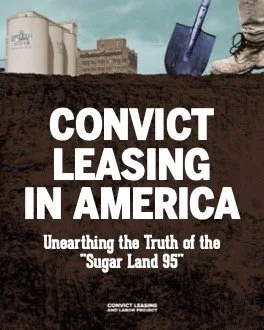CONVICT LEASING IN AMERICA: Unearthing the Truth of the "Sugar Land 95"
By Hanna Kim with the guidance of Reginald Moore and the Convict Leasing and Labor Project.
Many Americans learn about the vicious resistance to African American freedom that followed the Civil War and Reconstruction era. Jim Crow laws, lynchings, and the Ku Klux Klan are some of the well-known chapters of racial terrorism in U.S. history. But another effort to reinstitute slavery immediately after the war remains little known—passed over, left unexplained, swept under the rug. As the Civil War devastated the South, the South’s nascent prison system became the testing ground for crafting one of the earliest reincarnations of slavery. Convict leasing, a system in which Southern states leased prisoners to private parties, essentially re-enslaved many African Americans—men, women, and even children—who had been deemed free and equal by the Constitution’s 13th and 14th Amendments. Everyone involved in running this lucrative system profited from exploiting these prisoners, forcing them to work under inhumane conditions for almost no pay. Some people at the time even claimed that the convict leasing system was worse than slavery. Convict leasing helped revitalize the war-ravaged South and turn it into an industrialized stronghold with international reach. This report tells the story about convict leasing in a new way. It visually explains antiquated concepts and complex details, in order to help you understand precisely how convict leasing took advantage of and discriminated against its victims. It provides historical context, diving deep into convict leasing's mechanisms, brutality, and legacy. Ultimately, it seeks to awaken our common humanity and motivate all of us—regardless of race, ethnicity, age, gender, political alliances, or life experiences—to challenge the systemic racism that blinds us, silences us, imprisons us, kills us, forgets us, haunts us. History is not frozen in time, nor is it ever complete or perfect. It is messy, multifaceted, and always changing in relation to who is writing it. History depends on what we decide to remember, together. A local historian and activist named Reginald Moore will introduce you to the discovery of the “Sugar Land 95”—the remains of 95 African Americans who are believed to have labored under the convict leasing system in Sugar Land, Texas. The history of Sugar Land is not only sweet; it is also bitter.
Convict Leasing and Labor Project: 2020. 40p.


